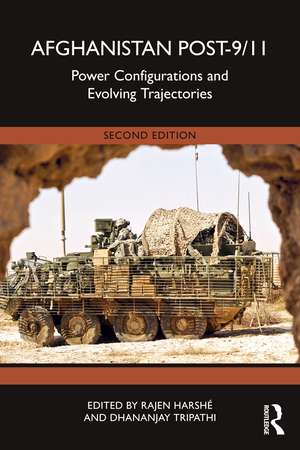Afghanistan in Transition: From Taliban to Taliban
Editat de Rajen Harshé, Dhananjay Tripathien Limba Engleză Paperback – 4 dec 2024
The essays in this volume,
- Locate Afghanistan under globalisation and reflects on the state and nation-building efforts in Afghanistan by shedding light on the status of citizens, especially women.
- Analyse on the Taliban, a proper examination of how the Taliban survives in all these years, and how it returned to power.
- Examine Afghanistan’s relations with major powers like the USA, China and India and explores the intricacies of ties between India, Pakistan, and Afghanistan within the Indian subcontinent.
Shedding light on a threshold moment in 21st world politics, this work will be useful to scholars and researchers in political science, international relations, sociology, area studies, and the interested general reader.
| Toate formatele și edițiile | Preț | Express |
|---|---|---|
| Paperback (1) | 287.42 lei 3-5 săpt. | +17.53 lei 5-11 zile |
| Taylor & Francis – 4 dec 2024 | 287.42 lei 3-5 săpt. | +17.53 lei 5-11 zile |
| Hardback (1) | 999.19 lei 6-8 săpt. | |
| Taylor & Francis – 4 dec 2024 | 999.19 lei 6-8 săpt. |
Preț: 287.42 lei
Nou
Puncte Express: 431
Preț estimativ în valută:
55.01€ • 57.21$ • 45.41£
55.01€ • 57.21$ • 45.41£
Carte disponibilă
Livrare economică 24 martie-07 aprilie
Livrare express 08-14 martie pentru 27.52 lei
Preluare comenzi: 021 569.72.76
Specificații
ISBN-13: 9780367243135
ISBN-10: 036724313X
Pagini: 164
Dimensiuni: 156 x 234 x 13 mm
Greutate: 0.32 kg
Ediția:2
Editura: Taylor & Francis
Colecția Routledge India
Locul publicării:Oxford, United Kingdom
ISBN-10: 036724313X
Pagini: 164
Dimensiuni: 156 x 234 x 13 mm
Greutate: 0.32 kg
Ediția:2
Editura: Taylor & Francis
Colecția Routledge India
Locul publicării:Oxford, United Kingdom
Public țintă
PostgraduateCuprins
PART I: Engaging with Afghanistan 1. Introduction 2. Situating Afghanistan in Globalising World 3. ‘Pragmatism’ against ‘Ideology’ in Transnational vs Regional jihadist groups: Situating Taliban and Islamic State-Khorasan on a Conflict-Cooperation continuum. PART II: What about Taliban? 4. Through the Lens of Belief: Taliban's Worldview and Its Influence 5. Pieced Peace in Afghanistan: Evaluating the Peace Processes for Ending the Conflict in Afghanistan Post-2014 6. State building in Talibanized Afghanistan: lessons from History PART III: Afghanistan and Major Powers 7. The U.S. Role in Afghanistan: A Critical Overview 8. China’s Engagement with Afghanistan: Quest for Security, Stability and Strategy 9. Is the Past a Prologue? Deciphering India’s North–West Engagement
Notă biografică
Rajen Harshé has taught Political Science and International Relations for more than four decades in places such as University of Hyderabad, Hyderabad, and South Asian University, New Delhi. He is a founding and the former Vice Chancellor of the Central University of Allahabad (2005-10), Prayagraj, India. He also worked as President of the G.B. Pant Social Science Institute (2014-20), Prayagraj. He has written extensively on African and International Affairs. His latest work is Africa in World Affairs Politics of Imperialism, the Cold War and Globalisation (Oxon, New York, New Delhi, Routledge, 2019).
Dhananjay Tripathi is Chairperson & Associate Professor (Senior Grade) at the Department of International Relations, South Asian University (SAU), New Delhi, India. His recent publications are (ed) Re-imagining Border Studies in South Asia (2020- Routledge Publication), Co-edited South Asia: Boundaries Borders and Beyond (2022- Routledge Publication), Afghanistan Post- 2014: Power Configurations and Evolving Trajectories (2016- Routledge Publication). Have contributed several articles to reputed international academic journals.
Dhananjay Tripathi is Chairperson & Associate Professor (Senior Grade) at the Department of International Relations, South Asian University (SAU), New Delhi, India. His recent publications are (ed) Re-imagining Border Studies in South Asia (2020- Routledge Publication), Co-edited South Asia: Boundaries Borders and Beyond (2022- Routledge Publication), Afghanistan Post- 2014: Power Configurations and Evolving Trajectories (2016- Routledge Publication). Have contributed several articles to reputed international academic journals.
Descriere
Owing to its geo-strategic location and mineral wealth, Afghanistan has acquired significance in the inter-state politics of Asia as well as world politics during the past decades. This book discusses the Taliban’s return which outlines the recent and current developments in contemporary Afghanistan.
